
The City is creating a cleaner, greener and quieter future. Through initiatives that support green infrastructure, pollinator habitat creation and protection of local biodiversity, the City is transforming Toronto’s urban landscape. Building on these efforts, the City is transitioning to zero-emission outdoor power equipment (ZEOPE)—adopting electric leaf blowers, lawn mowers, and manual tools like rakes—while phasing out gas-powered engine equipment.
Zero-emission outdoor power equipment includes battery-powered or corded leaf blowers and lawn mowers, along with human powered tools like push mowers and rakes. These tools are preferable to the gas-powered alternatives (especially the human powered ones) as they are quieter and do not emit harmful pollutants like particulate matter and hydrocarbons.
In Toronto, conventional turfgrass lawns are common, but they require frequent watering (accounting for about one-third of all residential water use) and demand time-intensive maintenance that often depends on outdoor power equipment. You can eliminate the use of these tools just by rethinking your lawn.
Torontonians can rethink their lawns by introducing native plants and other habitat-supporting alternatives that reduce environmental impact, promote biodiversity, and save time and money. Lawn conversion doesn’t have to mean turning your entire yard into a garden; options include incorporating low-growing, trample-resistant groundcovers that provide ecological benefits while maintaining the function of a conventional lawn.
By transforming lawns into thriving ecosystems, we can create healthier, quieter, and more sustainable urban spaces that benefit both people and wildlife.
The following is a list of sustainable lawn options well-suited to Toronto’s climate.
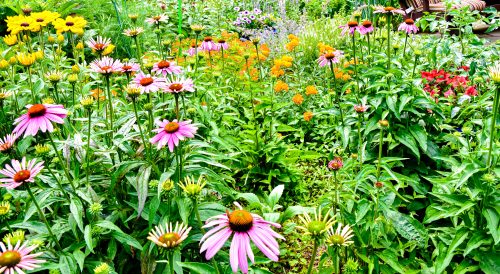
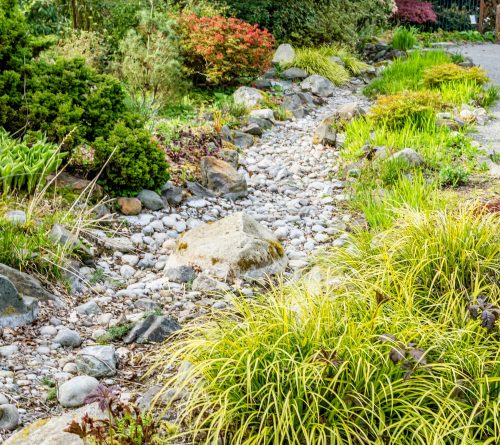
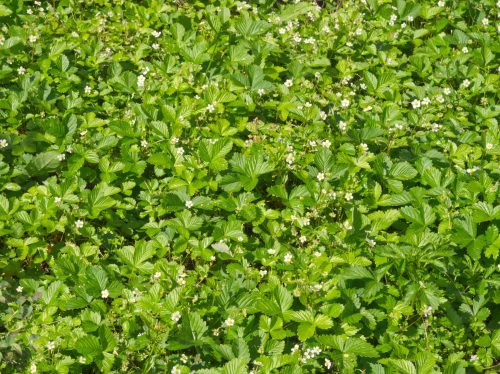
Ornamental Native Grasses
Native low-growing perennial grasses such as Pennsylvania sedge (Carex pensylvanica) add aesthetic appeal with minimal upkeep. They are drought-tolerant and thrive in various soil types, making them suitable for Toronto’s diverse conditions.
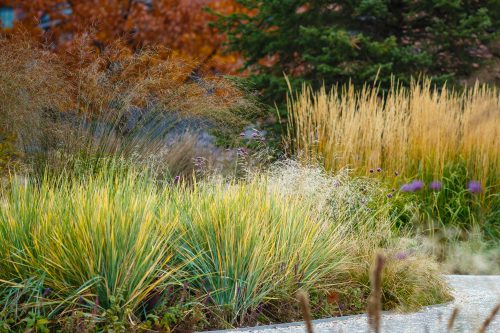
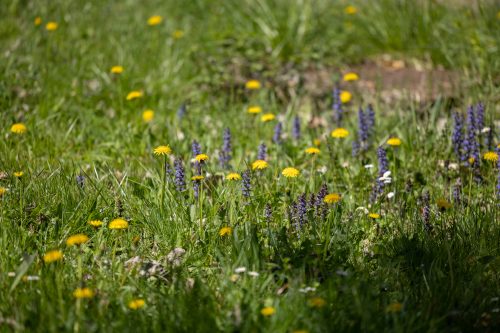
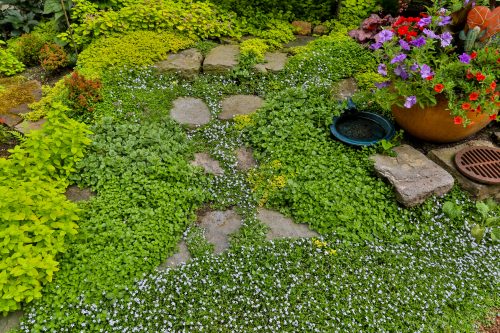
Clover Lawns
White clover (Trifolium repens) is a hardy ground cover that enriches soil by fixing nitrogen, reducing the need for fertilizers. It requires less water than traditional grass and provides nectar for pollinators. However, white clover is non-native, less tolerant of heavy foot traffic and may require reseeding every few years.
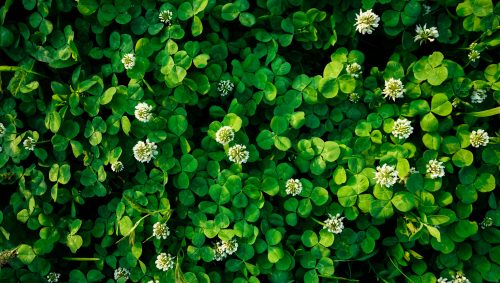
Xeriscaping
This landscaping method uses drought-resistant plants to create visually appealing gardens that require minimal watering. By selecting plants suited to dry conditions, xeriscaping conserves water and is ideal for dry areas where watering is difficult. For more information, check out the City’s drought tolerant plan guide, Drought Tolerant Landscaping.
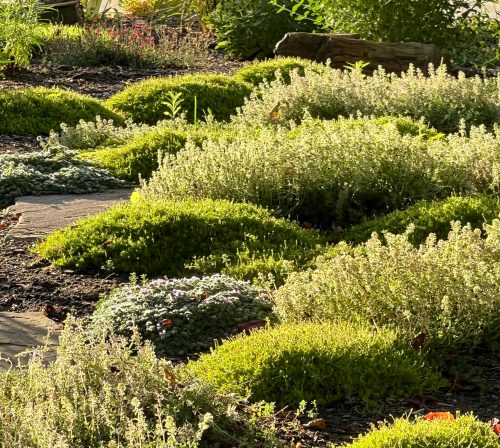
Leaf blowers and vacuums do more than just clear debris—they disrupt ecosystems. They strip away leaves, mulch and organic matter, remove essential nutrients from the soil, exposing plants to disease and potentially increasing reliance on chemical fertilizers and fungicides. The powerful gusts also displace beneficial insects and small creatures crucial to maintaining biodiversity¹. Birds, for example, rely on insects in leaf litter to feed their young, and when that food source is removed, it can have ripple effects across the entire food chain².
To view source for reference 1, see: Evidence of the Impact of Noise Pollution on Biodiversity: A Systematic Map
To view the source for reference 2, see Urbanisation Drivers and Underlying Mechanisms of Terrestrial Insect Diversity Loss in Cities.
You may have seen “leave the leaves” campaigns before, encouraging you to ditch the fall and spring garden clean-up.
Leaving the leaves in the fall turns your garden into winter habitat for pollinating insects, who do not emerge until about mid-May, when temperatures are above 10 degrees Celsius. Native pollinator species in Toronto need plant litter such as fallen leaves, dead hollow stems and logs to nest and survive the cold. Leaf litter is where many species of butterflies and moths overwinter as pupae or adults. Queen bumblebees overwinter by digging a small hole in the ground beneath leaf litter. Removing leaves removes important wintering habitats for native wildlife.
Cleaning up your garden too early in the spring will harm nesting pollinators. It is best to not partake in any garden clean-up for as long as possible in the spring. The earliest to start tidying up is once the weather has been consistently above 10 degrees Celsius (overnight too) for at least a week. This is because in early spring, insects are still hibernating. The insects will not be moving and need to be left alone until it is warm enough to emerge on their own.
Compost your leaves whenever possible; they are great sources of nutrients for lawns and gardens. Leaves protect and feed the soil naturally. Here are two ways to use leaves to feed your yard:
Can’t leave the leaves where they fall? Here are some other tips to collect leaves:
Remember to:
Want to learn more about protecting pollinators?
If it is necessary to use outdoor power equipment, please familiarize yourself with the rules for use so that your equipment is not disruptive. Outdoor power equipment includes devices used in the maintenance of lawns, including leaf blowers, lawnmowers, grass trimmers, chainsaws or any other similar equipment.
Avoid using your outdoor power equipment too early or too late in the day and let your neighbours sleep in on weekends and holidays. Powered devices can be used from 8 a.m. to 7 p.m. on weekdays. Power devices are also permitted from 9 a.m. to 7 p.m. on Saturdays, Sundays and statutory holidays. These rules do not apply to snow removal devices or devices used to maintain golf courses, public parks or any City operations, including services contracted by the City. Learn more about the rules for power devices in the Noise Bylaw.
Help keep our sidewalks clean by not blowing leaves and lawn clippings onto sidewalks and roads. Learn more about the regulations in the Use of Streets and Sidewalk Bylaw.
If you have concerns about leaf blower noise and leaves and debris being blown onto roads and sidewalks, consider speaking with those responsible to give them an opportunity to correct the issue. If this approach does not work, call 311 or submit a complaint online.
Concerns about power device noise during permitted hours in the Noise Bylaw can be submitted through 311 Toronto. Reports submitted will not be investigated, but will be logged and used to guide future policy and enforcement initiatives. It is important to provide as many specific details as possible about the noise, including its time and location, as well as the type of equipment being used (if possible).
July 4, 2017: City Council adopted the report, TransformTO: Climate Action for a Healthy, Equitable and Prosperous Toronto – Report 2 – The Pathway to a Low Carbon Future (2017.PE19.4), Attachment C – Evaluation of Potential Additions to TransformTO Report 1 Strategies, which provided an overview of City activities and issues related to gas powered lawn and garden equipment.
September 30, 2020: City Council adopted Request to Study the Environmental Impact of Two-Stroke Engine Garden Equipment (2020.IE15.8) which requested the City Manager, in consultation with the Medical Officer of Health, to report back in the first quarter of 2021 on the environmental and associated health impacts of gasoline powered two-stroke engine leaf blowers and other similarly operated garden equipment, including the feasibility of a year-round ban or a ban from May to September. Council also requested the City Manager, in consultation with the Medical Officer of Health and the Executive Director of Municipal Licensing and Standards, to report back on the noise generated from gas-powered and electric leaf blowers and other similar garden equipment, including the feasibility of a year-round ban or a ban from May to September.
October 26, 2021: Infrastructure and Environment Committee, in its adoption of the report, Phasing Out Gas-Powered Leaf Blowers for Municipal Use (2021.IE25.21), requested the General Manager, Parks, Forestry and Recreation, the General Manager, Transportation Services and the General Manager, Fleet Services to report back in the first quarter of 2022 with a transition plan and feasibility assessment of phasing out gas-powered leaf blowers for municipal use by 2025.
December 15, 2021 — in its decision Part 20 on the report, TransformTO – Critical Steps for Net Zero by 2040 (2021.IE26.16), City Council expressed its support for a ban on use of two-stroke engine leaf blowers, lawnmowers and other small engine equipment and vehicles and requested a report back on the implementation of a ban as part of the noise update report in 2022. Report 2021.IE26.16 Attachment F – Small Engine Lawn and Garden Equipment, responded to a request (2020.IE15.8) to report on the environmental and associated health impacts of gasoline-powered, two-stroke engine leaf blowers and other similarly operated garden equipment, including the feasibility of a year-round ban or a ban from May to September.
July 19, 2022 — City Council adopted the Report on Outstanding Noise Issues (2022.EC31.4), including a Supplementary Report – Outstanding Noise Directives – Additional Information on Leaf Blower Noise (2022.EC31.4a), which responded to a request from City Council (2021.IE26.16). In its decision City Council amended Toronto Municipal Code Chapter 591, Noise, Section 2.6 – Power devices, to further restrict when the devices can be used and to exempt all City operations (including services contracted by the City) from the bylaw. City Council directed the General Manager, Parks, Forestry and Recreation to develop a plan to phase-out the gas-powered equipment that is used by Parks, Forestry and Recreation, within a reasonable timeframe. City Council directed the Executive Director, Municipal Licensing and Standards, to undertake public education on appropriate use of lawn equipment and to report back during the Noise Bylaw Review in 2023 regarding options for setting decibel limits for power devices.
January 30, 2023 — Infrastructure and Environment Committee directed the City Manager to report back to the April 26, 2023 meeting of Infrastructure and Environment Committee with a plan to implement a ban on use of two-stroke engine leaf blowers, lawnmowers and other small engine equipment because of their adverse impact on air quality and human health, separately from the noise bylaw review referred to in Recommendation 20 of Item IE26.16, in its decision on Net Zero Actions Update (2023.IE1.11). This report responds to that direction.
June 21, 2023 – The City Manager reported back to the Infrastructure and Environment Committee. This report outlined the first step, which is to seek Council direction on whether Council wishes to pursue a ban on two-stroke engines within Toronto. Subject to City Council direction and resourcing, and following consultation with residents and businesses, a second report would be brought forward to provide a detailed plan to establish, implement, enforce and encourage compliance with a ban, including a proposed bylaw. (Two-Stroke Engine Small Equipment: Steps to Pursue a Ban).